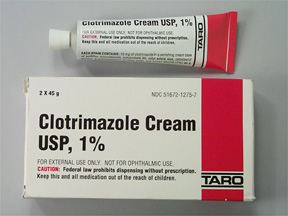
Antifungal Clotrimazole Coupons & Savings Card – Discount Prices from $5.58
Brand for: Clotrimazole
My prescription
Edit
14.2GM of 1%, Clotrimazole (1 Tube)
Select pharmacy

CVS
$19.59
COUPON PRICE
Walmart
$5.58
COUPON PRICE
Albertsons
$7.50
COUPON PRICE
Walgreens
$10.36
COUPON PRICEAntifungal Clotrimazole savings card
Show this card to your pharmacist
Walmart
$5.58
BIN
ID
PCN
GRP
019876
LH7C34F7A0
CHIPPO
LHX
Powered by
More prescriptions for yeast infection
More prescriptions for yeast infection
Price history for Antifungal Clotrimazole (brand) & Clotrimazole (generic)
1 Tube, 14.2GM
Average retail price for Antifungal Clotrimazole
Average retail price for Clotrimazole
Average SaveHealth price for Clotrimazole
Our price history data is based on aggregated prescription data collected from participating pharmacies in America. Our prescription data updates daily to reflect the latest price changes. If you notice a missing data point, it means there wasn't sufficient data available to generate a monetary value for that date.
Over the last 12 months, the average discount price of Antifungal Clotrimazole is $14.74 using the SaveHealth savings card. That's an average savings of -153.70% on Antifungal Clotrimazole with our discount card.
*Retail prices are based on pharmacy claims data, and may not be accurate when we don't have enough claims.
Antifungal Clotrimazole (Clotrimazole) dosage forms
Dosage Quantity Price from Per unit 14.2GM 1 Tube $5.58 $5.58 14.2GM 2 Tubes $8.67 $4.33 14.2GM 3 Tubes $11.75 $3.92
| Dosage | Quantity | Price from | Per unit |
|---|---|---|---|
| 14.2GM | 1 Tube | $5.58 | $5.58 |
| 14.2GM | 2 Tubes | $8.67 | $4.33 |
| 14.2GM | 3 Tubes | $11.75 | $3.92 |
Is clotrimazole a good antifungal?
Clotrimazole is an effective antifungal medication commonly used to treat various fungal infections, including athlete's foot, jock itch, and yeast infections. It works by inhibiting the growth of fungi, making it a reliable option for managing these conditions.
Is clotrimazole safe for private parts?
Clotrimazole is generally considered safe for use on the external genital area to treat fungal infections such as yeast infections. However, it should be used as directed by a healthcare provider or according to the instructions on the packaging. If there is any irritation or if symptoms persist, it is advisable to consult a healthcare professional.
Can I buy clotrimazole over the counter?
Yes, clotrimazole is available over the counter. It is commonly used as an antifungal treatment for conditions such as athlete's foot, jock itch, and yeast infections.
When should you not use clotrimazole?
Clotrimazole should not be used by individuals who are allergic to it or any of its components. It is also advisable to avoid using clotrimazole on broken or irritated skin unless directed by a healthcare provider. Pregnant or breastfeeding individuals should consult a healthcare professional before using clotrimazole. Additionally, it should not be used in the eyes, mouth, or on the face. If symptoms persist or worsen, it is important to seek medical advice.
Is there an over the counter version of clotrimazole?
Yes, clotrimazole is available over the counter in various forms, such as creams, lotions, and powders, for the treatment of fungal infections like athlete's foot, jock itch, and ringworm.
